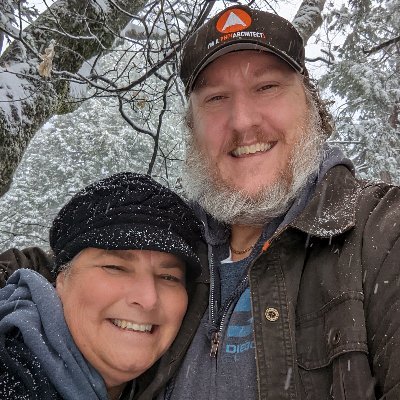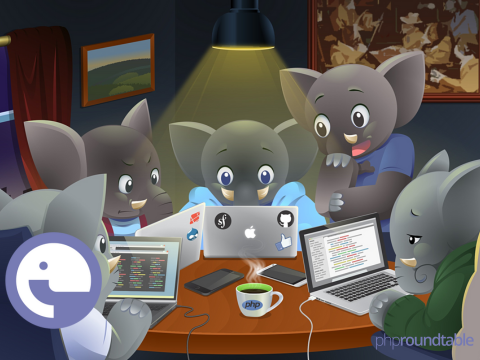The PHP podcast where everyone has a seat.
Unlock the power of command-line interfaces and text-based user interfaces with PHP in our latest PHPRoundtable episode: ‘CLIs and TUIs with PHP for Fun and Profit’. Join us as we dive deep into how developers are leveraging PHP to create robust and interactive CLI and TUI applications that drive productivity and innovation. Whether you’re looking to streamline your workflows and automation or just develop tools that will help you be more profitable, this discussion will provide you with insi... (Full Show Notes)
93: PHPRoundtable September 2024 - CLIs and TUIs with PHP for fun and profit
Unlock the power of command-line interfaces and text-based user interfaces with PHP in our latest PHPRoundtable episode: ‘CLIs and TUIs with PHP for Fun and Profit’. Join us as we dive deep into how developers are leveraging PHP to create robust and interactive CLI and TUI applications that drive productivity and innovation. Whether you’re looking to streamline your workflows and automation or just develop tools that will help you be more profitable, this discussion will provide you with insight...
92: PHPRoundtable August 2024 - Event Sourcing
Dive deep into the world of Event Sourcing with us on the next PHPRoundtable! We're unraveling the complexities of this powerful architectural pattern with a stellar lineup of experts. Daniel Coilbourne, Chris Morrell, and Shawn McCool will be joining forces with our regular panelists, Eric Van Johnson, TJ Miller, Sara Golemon, and Joe Ferguson. Discover the ins and outs of Event Sourcing: what it is, why it matters, and how to master its implementation in your projects. Don't miss this insightf...
91: PHPRoundtable July 2024
In this episode on PHPRoundtable, the panel discusses the adoption and current state of PHP in the industry. We also share out thoughts on what we feel could be some potential improvements for the development experience. We also talk about the importance of understanding PHP's internals and embracing change to keep up with the evolving landscape.
90: PHPRoundtable June 2024
In this episode on PHPRoundtable, the panel discusses the adoption and current state of PHP in the industry. We also shared our thoughts on what we feel could be some potential improvements to the development experience. We also talk about the importance of understanding PHP's internals and embracing change to keep up with the evolving landscape.
89: PHPRoundtable May 2024
Derick Rethans hooped on to the show to join Eric, Sara, Joe, and TJ, and discuss security in PHP, PHP Internals, and Tracing. Here are some links from the show. glibc/iconv Vulnerability The GNU C Library security advisories TaskFile Open Telemetry PHP PHP BCMath RFC Python NumPy Panel Eric Van Johnson - X / Mastodon Sara Golemon - Mastodon Joe Ferguson - X / Mastodon TJ Miller - X / Mastodon Derick Rethans - X / Mastodon
88: Bridging Binaries: The Dance of Developer Diplomacy
Join us on the next PHPRoundtable as we decode the superheroes behind the scenes in the tech world! No, they don't wear capes (usually), but they're the bridge-builders, the peace-makers, and the tech whisperers. Dive into the enigmatic world of Developer Relations, find out who they are, what magic they weave, and how they keep both sides of the code fence talking. It's 'Relations'... but not the kind you're thinking.
87: Open Sourcing Mental Health
On this panel we sit down with the team from Open Sourcing Mental Health whose motto is "Stronger Than Fear". Open Sourcing Mental Health is a non-profit, 501(c)(3) corporation dedicated to raising awareness, educating, and providing resources to support mental wellness in the tech and open source communities. OSMI began in 2013, with Ed Finkler speaking at tech conferences about his personal experiences as a web developer and open source advocate with a mental health disorder. The response was...
86: The Education of Development
In this episode of PHPRoundtable, we have a panel of instructor, students, and professional to talk about the Education of Development and Coding. We discuss formal, structure programs to self taught. What is the best was to learn to code? You can join us live in our Discord Channel https://discord.gg/wmD3sGnMMe
85: The State of PHP Usergroup Organizers
With life getting closer and closer to normal, User Groups are making a comeback. Running a PHP Usergroup can be very rewarding at times and feel thankless at other times. There is a lot of benefit to becoming a Usergroup Organizer, like deciding what the group talks about at meetups. At this Roundtable, we talk with several PHP Usergroup organizers and discuss the pros and cons of running a PHP User Group and what some helpful tips and tricks are.
84: Back at the Table
There has been a long hiatus from the Roundtable but we are back. This month I am joined by Sara Golemon, Joe Ferguson, and Ben Ramsey and we talk about the current state of PHP.
83: 10 Years of Laravel
10 years of Laravel, and the framework continues to grow stronger with the passing of each release. More and more talented developers are creating packages and contributing to the overall health of Laravel.
82: A Seat at the Table
Sammy opens the Roundtable back up. Everyone talks about what they've been doing for the past few years. What we are up to now. And what the future holds for The PHPRoundtable.







![php[tek] Conferences](https://cdn.phparch.social/phproundtable/sponsor_logos/01J7Z80YTXJ40MSM3RNV2DAQPQ.png)